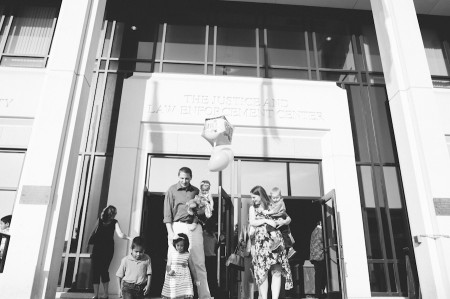November is National Adoption Awareness Month. I’ve written several half-finished pieces that just feel so incomplete as I try to say something about the importance of adoption in the life of my family. We are a decade into this adoptive parenting thing and I feel less certain than ever about how to portray it accurately and honestly, with its real joys and struggles.
The truth is, I have learned to write less, talk less, and listen more. As I’ve listened to my kids and their experiences of adoption, I’ve come to understand a few things the books didn’t prepare me for.
Adoption doesn’t define my kids. Sometimes it’s a fun fact they want to bring up when they’re making a new friend. Sometimes it’s intensely personal and private information they don’t want shared. Those are their decisions to make. I don’t talk to other people about their adoption stories. As crazy as it sounds, sometimes my kids’ peers even see us together (we are a very racially mismatched family) and don’t put the pieces together. This seems bizarre to me until I look back as an adult and realize I had transracially adopted friends and it never really occurred to me that was what was going on. Sometimes kids are less curious or more accepting than we imagine.
I used to see my kids’ hesitancy to talk about adoption as them feeling shameful and I tried to pushback against that. Now I realize they’re just careful about who deserves their story and I respect that. Outing themselves as adopted has different implications for them than it does for me as their mother. They need to be able to decide when and how they do that. If that isn’t something they want to explain during their turn as “Star of the Week” at school, that’s totally up to them. We practice how they can answer invasive questions in ways that feel empowering to them. Adoption may be something I’m proud of, but it doesn’t mean they have to define themselves that way before people know the other awesome things about them.
Adoption starts with loss, but it doesn’t end there. It seems like people have one of two extreme reactions when they find out someone is adopted. They are either overwhelmed with how tragic it is that they weren’t able to be raised in their birth homes, or they are super upbeat about how great it must be to be adopted. The truth is really somewhere in the middle. . . or both extremes at the same time. My kids have lots of complicated and complex feelings about adoption. They may be happy to be in our family while also being sad that they were denied the ability to be raised in their birth family. They are able to hold both of those feelings in tension together. Adoption is not all good or all bad, but a mix of loss and redemption.
My job is not to try and funnel my kids into feeling the “correct” emotions that validate my own views of adoption. I can be a safe place for them to vent their hard emotions so they don’t have to carry them alone. Even if it’s hard for me to hear their struggles, that’s my job. And when the moments come that my kids tell me they love being adopted and they don’t know why anybody would be sad about it, I’m not going to try to talk them into feeling differently in some kind of quest for “authenticity.” They feel how they feel and it changes by the day.
My kids need adoption community. For me, adoption was the happy ending to my infertility problem. For them, it wasn’t an ending, but a beginning. My kids have lots of adoptees in their world (both peers and adults) and this has been of immeasurable value as they work through their story. They need to know their feelings are normal. Even when they don’t talk to their friends about adoption, just knowing they have that in common is helpful. They know they aren’t alone. They can see the pros and cons of many types of adoption play out as they see the experiences of other adoptees in their world.
It’s humbling as a parent to realize my experience of adoption is so different from theirs. I think it’s incredibly important for adoptive parents to invest in connection with adult adoptees to reorient our perspective. It’s hard to know I can’t be the one to normalize some of these things for my kids. I can’t give them wisdom from my own experience when it comes to their personal struggles. But I can plug them into people I trust who have lived this life ahead of them.
As adoptive parents, I think we have to let go of our desire to control the adoption narrative. We can celebrate how positive it’s been for us, while also grieving the losses adoption has brought into our children’s lives. We can support them feeling how they need to feel. In a month dedicated to “adoption awareness” I find myself more and more aware that my experience of adoption will continue to change through the years. It’s fluid. It isn’t one thing, one perspective, one story. Adoption is beautifully complex and I’m blessed to be the one who gets to help my kids navigate it.


One Comment
Leave a reply →